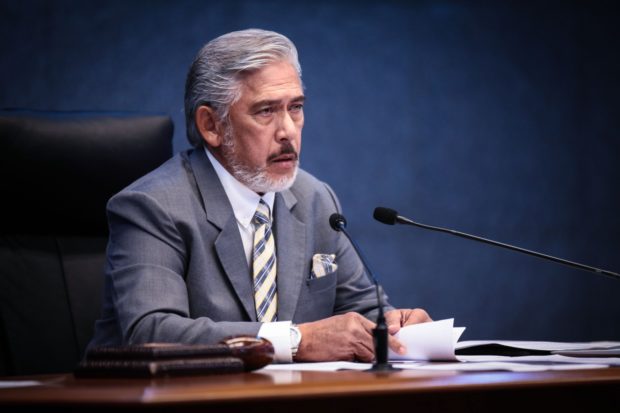MANILA, Philippines — Agriculture Secretary William Dar should disclose who in the government or private sector lobbied for the twin policies that allowed pork imports to flood the local market, Senate President Vicente Sotto III said on Monday.
“I want to know whose bright idea it was to hike the import ceiling and lower import taxes on pork. Which official from the DA (Department of Agriculture) suggested this?” the Senate leader said in a statement.
He was referring to Executive Order (EO) No. 128, which reduced the tariffs on pork imports from a high of 40 percent to just 5 percent, and a separate recommendation to raise the minimum access volume (MAV) for pork imports by 350,000 metric tons (MT) from the current 54,210 MT.
“Why do they want us to import beyond what is required and at the same time lower tariff? What is the logical explanation here?” Sotto asked.
He said the DA should be prepared with answers when the Senate committee of the whole resumes its inquiry on pork importation on Dar’s watch.
Resistance at the House
Dar, on Monday, faced a joint hearing by the House committees on agriculture and food and trade and industry, as he maintained that the increase in the quantity of pork imports at lower tariffs would “not kill the local hog industry.”
“Our ultimate goal is really the imports will lower the prices of pork in the market and tame inflation,” he said.
But the EO is also being opposed at the House of Representatives. At least 22 more congressmen, including allies of President Duterte, have crossed party lines and signed House Joint Resolution No. 37 urging him to terminate the EO.
They are Iloilo Rep. Michael Gorriceta, Ilocos Norte Rep. Ria Christina Fariñas, Negros Occidental Rep. Leo Rafael Cueva, Quezon City Rep. Onyx Crisologo, Sorsogon Rep. Evelina Escudero, La Union Rep. Pablo Ortega, Recoboda Rep. Godofredo Guya, Apec Rep. Sergio Dagooc, Philreca Rep. Presley de Jesus, Ako Padayon Rep. Adriano Ebcas, Biñan City Rep. Len Alonte, Abra Rep. Joseph Sto. Niño Bernos, Cavite Rep. Luis Ferrer IV, Nueva Ecija Rep. Estrellita Suansing, Sultan Kudarat Rep. Horacio Suansing, TUCP Rep. Raymond Democrito Mendoza, Bacolod City Rep. Greg Gasataya, Cavite Rep. Alex Advincula, Batangas Rep. Vilma Santos-Recto, Isabela Rep. Ed Christopher Go, Misamis Occidental Rep. Diego Ty and LPGMA Rep. Allan Ty.
Earlier, 17 lawmakers signed the resolution filed on April 14.
Under the resolution, the lawmakers warned that the government would lose P14 billion in revenues due to the reduced tariffs.
‘Now in effect’
They also cautioned that the recommended increase for pork imports would kill the local hog industry and lead to more loss of jobs and livelihood.
Dar said EO 128 “is now in effect and that continues to be implemented by us.”
But senators had earlier warned that a joint resolution by Congress may withdraw the power to increase the MAV delegated to the President.
Malacañang had already indicated it would abide by the decision of Congress on this matter.
Sotto said the DA should not allow itself to shoulder the blame if it turned out that the policies in question came from a private entity.
“If it were not the DA that pushed this executive order, then who pushed for it? I want them to answer this question: Is this [EO No. 128] truly beneficial to the Philippines? Will it truly help Filipinos or only a few businessmen and politicians?” he said.
Sotto said the EO was contrary to Mr. Duterte’s guarantee that prices of pork and other food products would remain accessible to the people amid the worsening COVID-19 pandemic.
“I believe that the President intended the EO to assure our people that government is in control and that the welfare of our hog raisers, fishermen and farmers will always be the priority,” Sotto said.
“This EO is supposed to be in line with the intentions of the President, but the end product is not,” he added.
“He would not have signed this if he knew that his order would have a negative impact on the hog and agriculture industries. He would not have signed this if no one lobbied for it,” Sotto also said.


